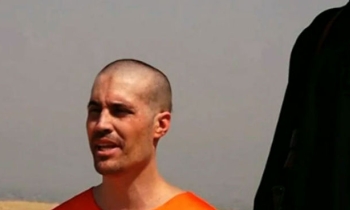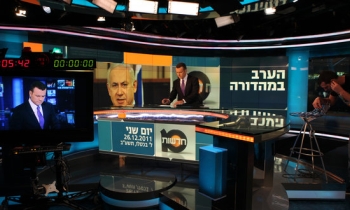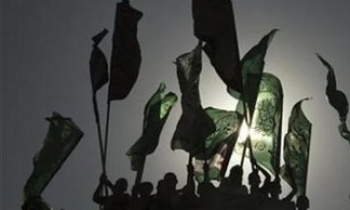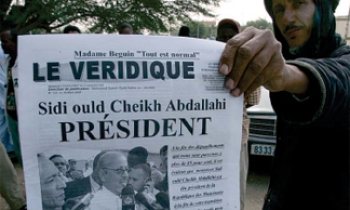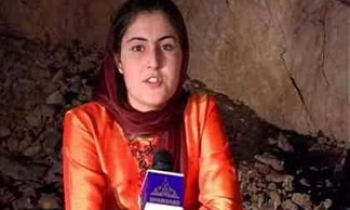The American public continues to fault news organisations for a number of perceived failures, with solid majorities criticising them for political bias, inaccuracy and failing to acknowledge mistakes. Some of the harshest indictments of the press now come from the growing segment that relies on the Internet as its main source for national and international news.
The Internet news audience – roughly a quarter of all Americans – tends to be younger and better educated than the public as a whole. People who rely on the Internet as their main news source express relatively unfavourable opinions of mainstream news sources and are among the most critical of press performance. As many as 38 per cent of those who rely mostly on the Internet for news say they have an unfavourable opinion of cable news networks such as CNN, Fox News Channel and MSNBC, compared to 25 per cent of the public overall, and just 17 per cent of television news viewers.

The Internet news audience is particularly likely to criticise news organisations for their lack of empathy, their failure to "stand up for America," and political bias. Roughly two-thirds (68 per cent) of those who get most of their news from the Internet say that news organisations do not care about the people they report on, and 53 per cent believe that news organisations are too critical of America. By comparison, smaller percentages of the general public fault the press for not caring about people they report on (53 per cent), and being too critical of America (43 per cent).
The survey by the Pew Research Center for the People & the Press, conducted July 25-29 among 1,503 adults, finds a continuing pattern of deep partisan differences in public views of news organisations and their performance. Far more than twice as many Republicans as Democrats say news organisations are too critical of America (63 per cent vs 23 per cent), and there is virtually no measure of press values or performance on which there is not a substantial gap in the views of partisans.
More broadly, the new survey underscores the fundamental change in basic attitudes about the news media that has occurred since the mid-1980s. In the initial Times Mirror polling on the press in 1985, the public faulted news organisations for many of its practices: most people said that news organisations "try to cover up their mistakes," while pluralities said they "don't care about the people they report on," and were politically biased.

But in the past decade, these criticisms have come to encompass broader indictments of the accuracy of news reporting, news organisations' impact on democracy and, to some degree, their morality. In 1985, most Americans (55 per cent) said news organisations get the facts straight. Since the late 1990s, consistent majorities – including 53 per cent in the current survey – have expressed the belief that news stories are often inaccurate. As a consequence, the believability ratings for individual news organisations are lower today than they were in the 1980s and 1990s. (See "Online Papers Modestly Boost Newspaper Readership," July 30, 2006.)
Yet for all of the public's gripes about the press, people also say they like various news sources – local TV news, network news, cable TV news and the daily newspapers they are most familiar with. Though the numbers have declined in recent years, Americans continue to have more positive than negative impressions of these news organisations, and rate them far higher than most political institutions, including Congress, the Supreme Court and the political parties.
One factor behind this, the researchers felt, may be the public's broad and continuing support for the news media's role as political watchdog. Currently, 58 per cent say that by criticising political leaders, news organisations keep political leaders from doing things that should not be done, while just 27 per cent say such scrutiny keeps political leaders from doing their jobs.

In addition, the public gives news organisations high marks for professionalism and caring about how good a job they do. Two-thirds (66 per cent) view news organisations as highly professional – rather than not professional – up from 59 per cent two years ago and a low of 49 per cent in 2002.
The deep political divisions in opinions about the press are reflected in views of coverage of the Iraq war. Overall, about four-in-ten Americans (42 per cent) express a great deal or a fair amount of confidence that the press is giving the public an accurate picture of how the Iraq war is going. By comparison, more people (52 per cent) say they are confident that the US military is presenting an accurate picture of the war.
Republicans express little confidence in the accuracy of war coverage. Only about a third of Republicans (34 per cent) say they have a great deal or a fair amount of confidence the press is giving an accurate picture of the war. More than twice as many Republicans (76 per cent) have confidence that the US military is accurately portraying the war in Iraq.
By contrast, a solid majority of Democrats (56 per cent) have confidence in the press to give an accurate picture of Iraq, while just 36 per cent express comparable trust in the US military. Nearly a quarter of Democrats (23 per cent) say they have "no confidence at all" in the military to give an accurate account of progress in the war; about the same percentage of Republicans expresses no confidence in the press (26 per cent).

Half of independents say they have a great deal or a fair amount of confidence in the military to give an accurate picture of how the war is going, while nearly as many independents (46 per cent) express little or no confidence in the military. Yet independents have significantly less trust in the press when it comes to war coverage; just 38 per cent are confident the press is giving an accurate picture of war developments, while 60 per cent have little or no confidence in war coverage.
Public confidence in how well the military and the press are doing in informing the public about the war has changed little since the spring. In Pew's weekly News Interest Index survey conducted March 30-April 2, 46 per cent said they had a great deal or a fair amount of confidence in the military to give an accurate picture of the war, while 38 per cent said the same about the press. Confidence in both institutions is down substantially since the early phase of the war; in March 2003, 85 per cent expressed confidence in the military to give an accurate picture or war progress while nearly as many (81 per cent) voiced confidence in the press.

